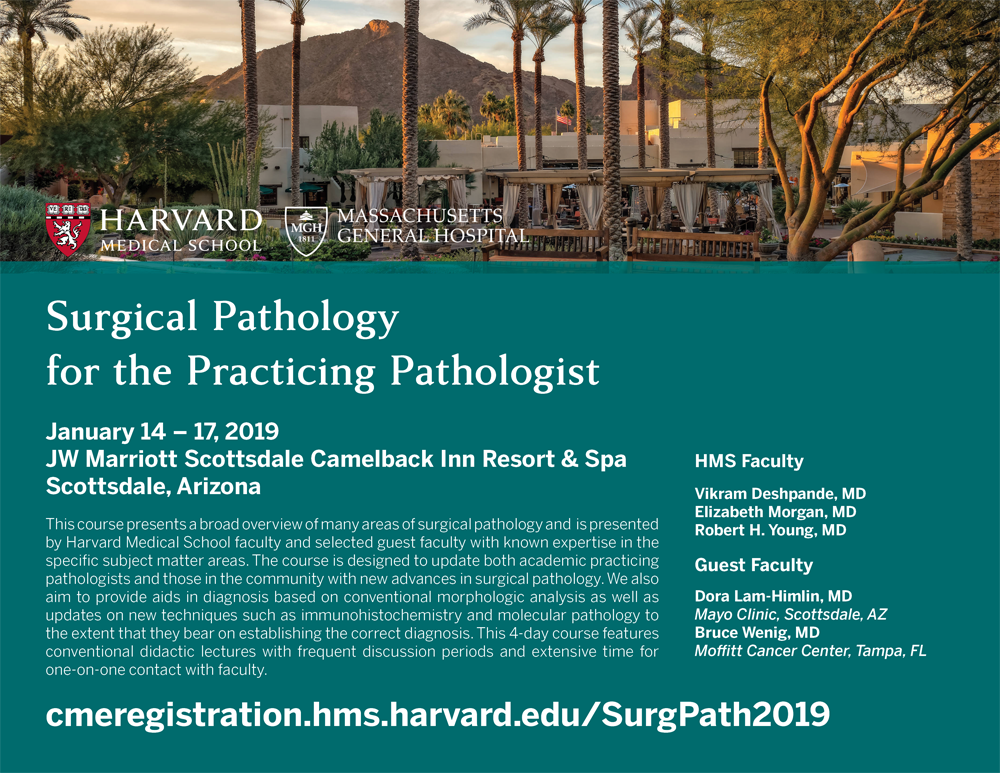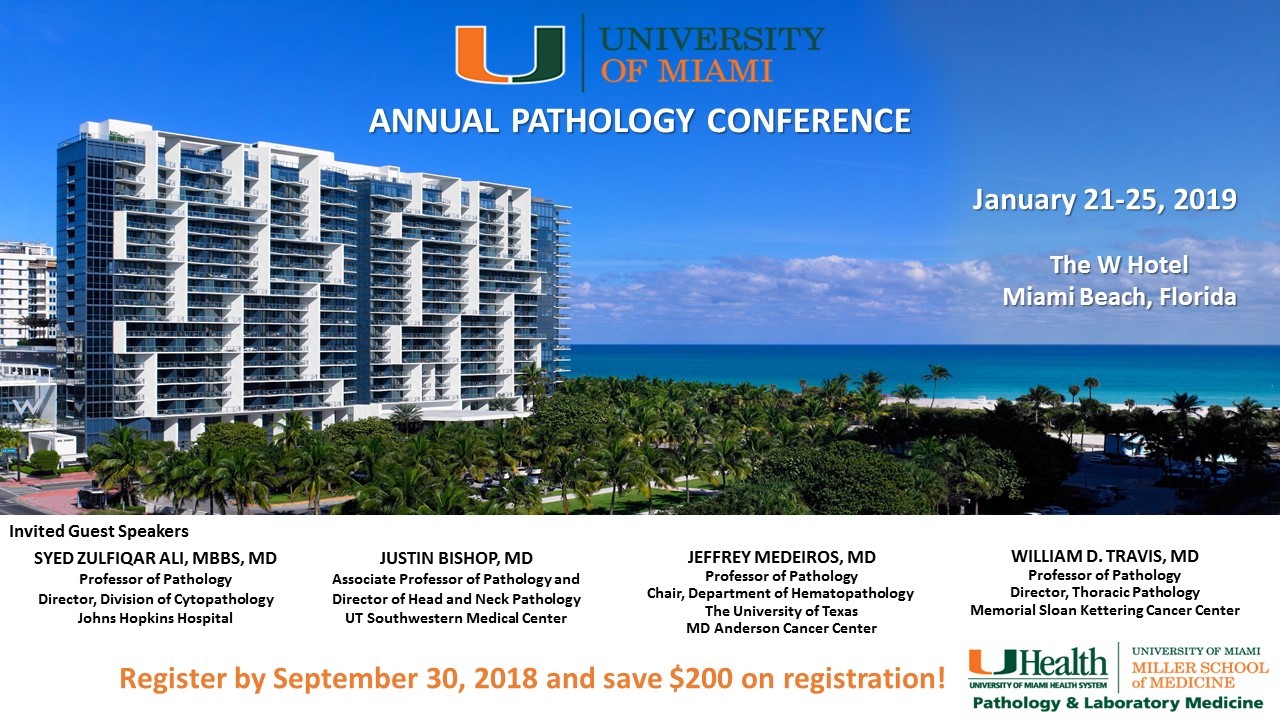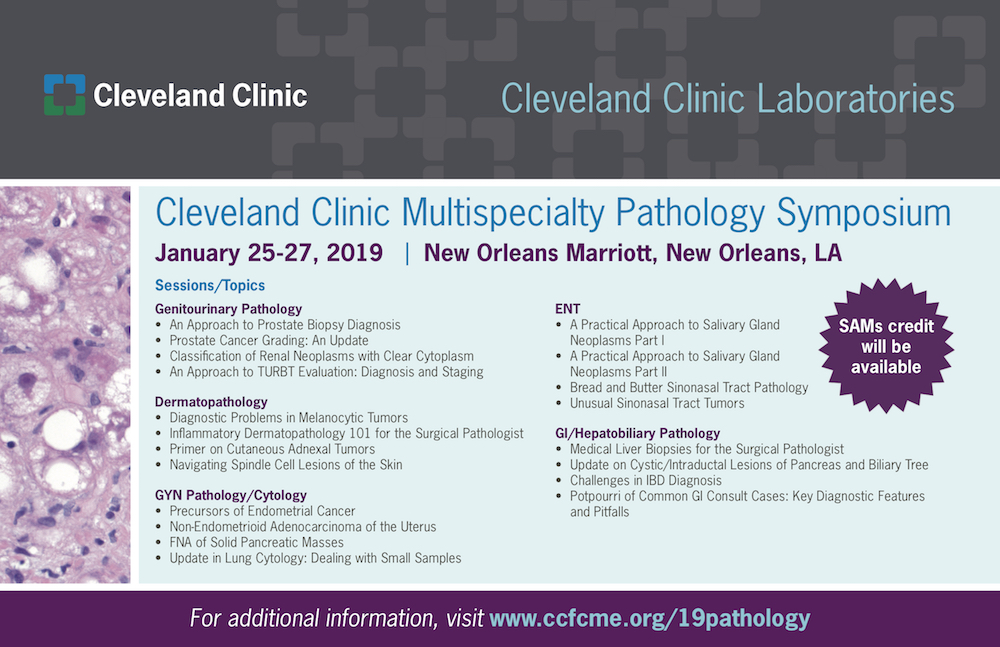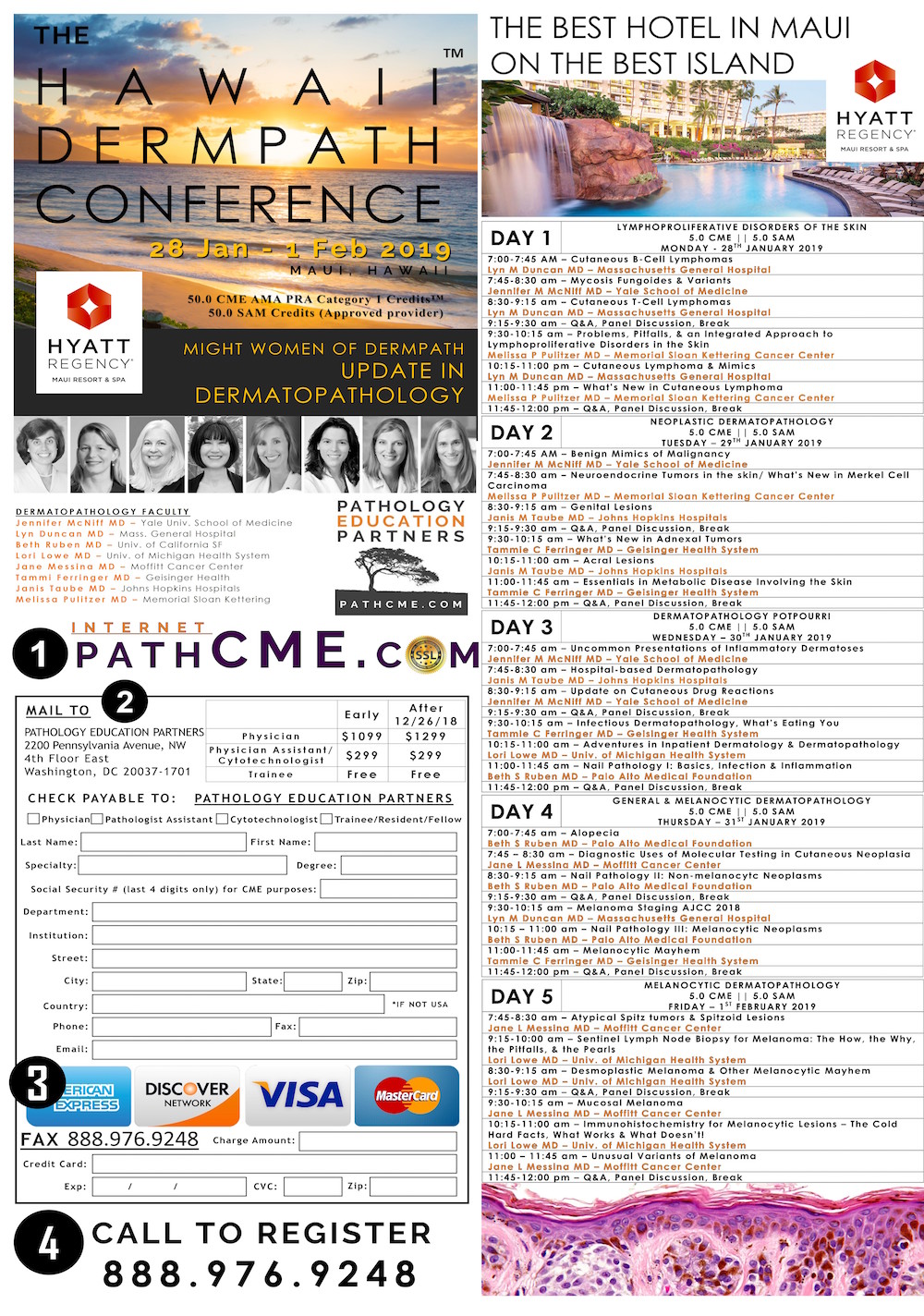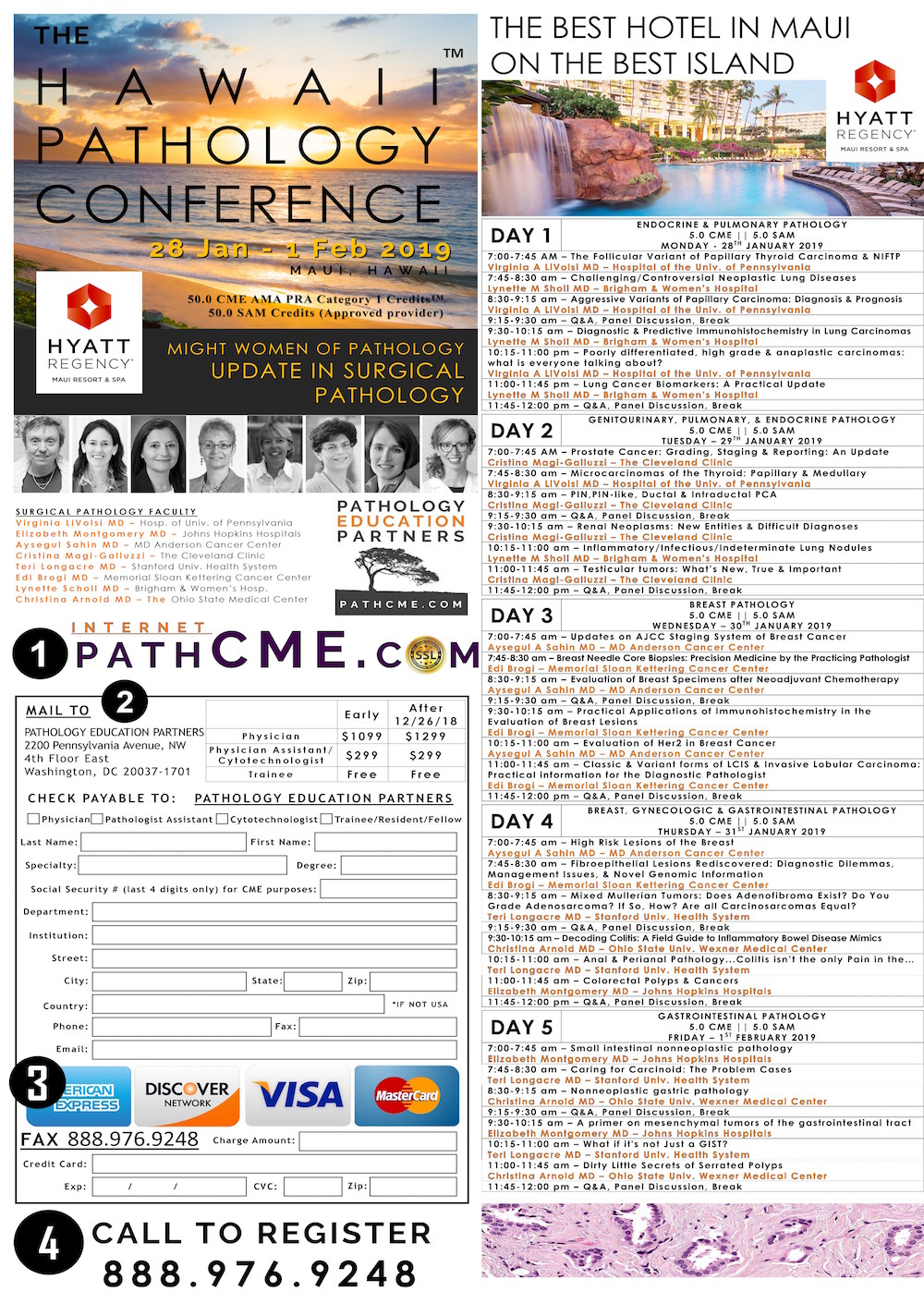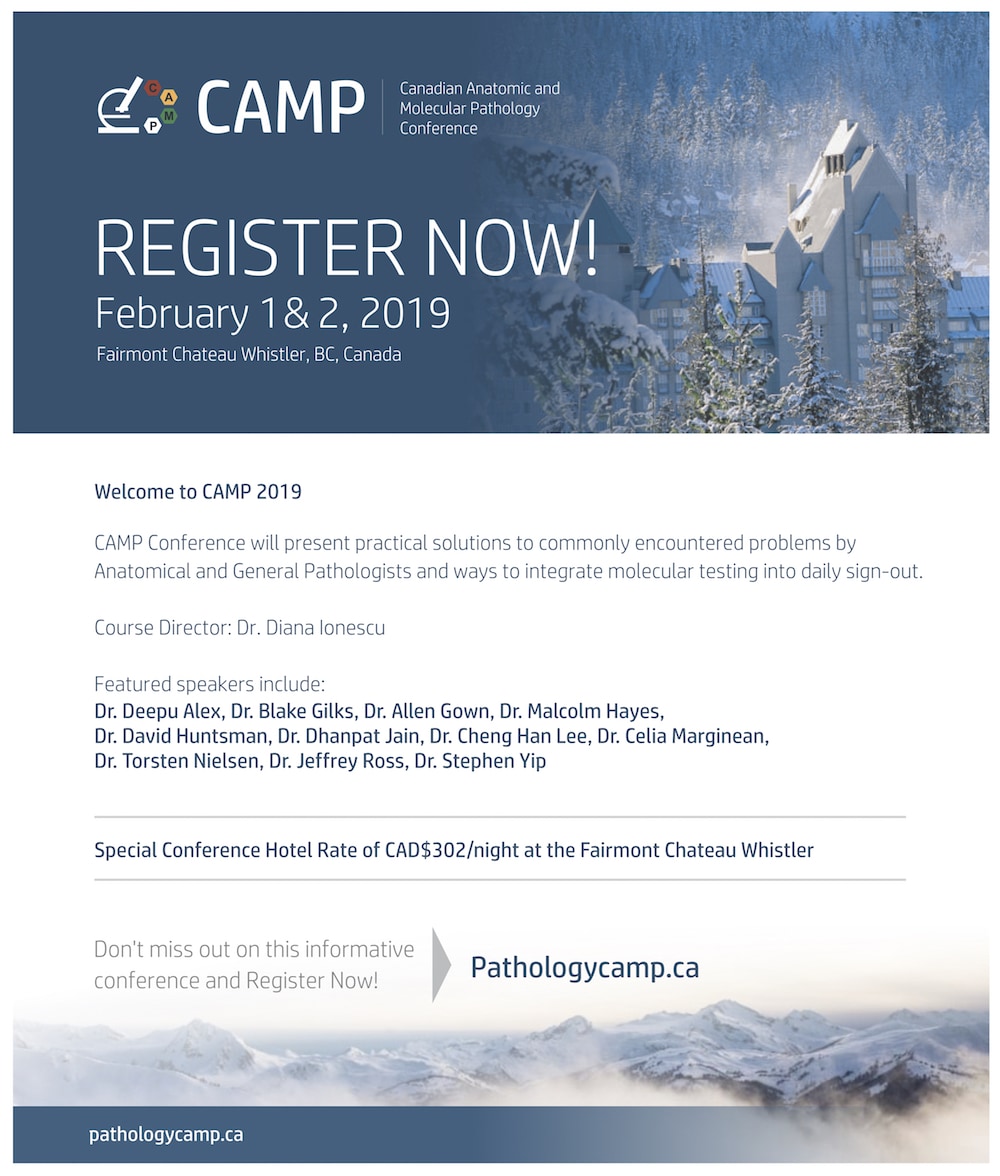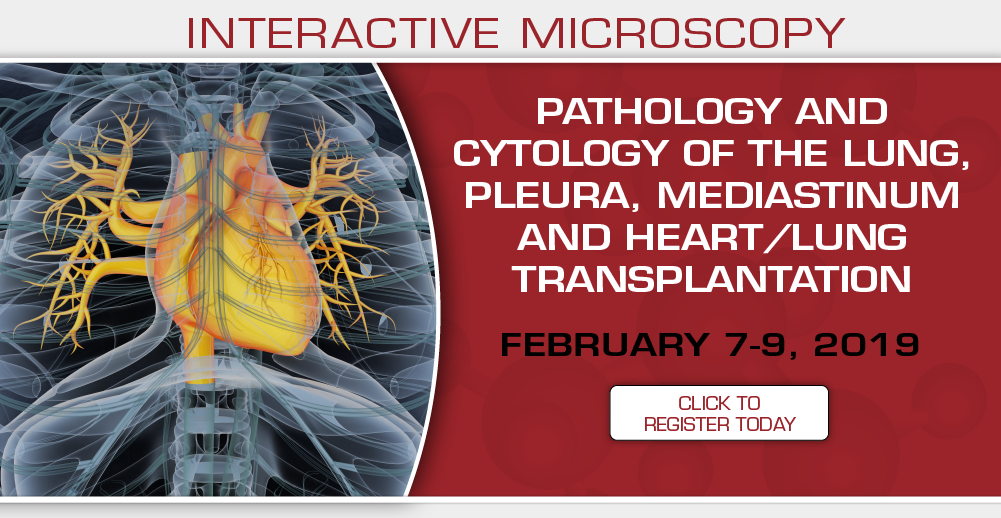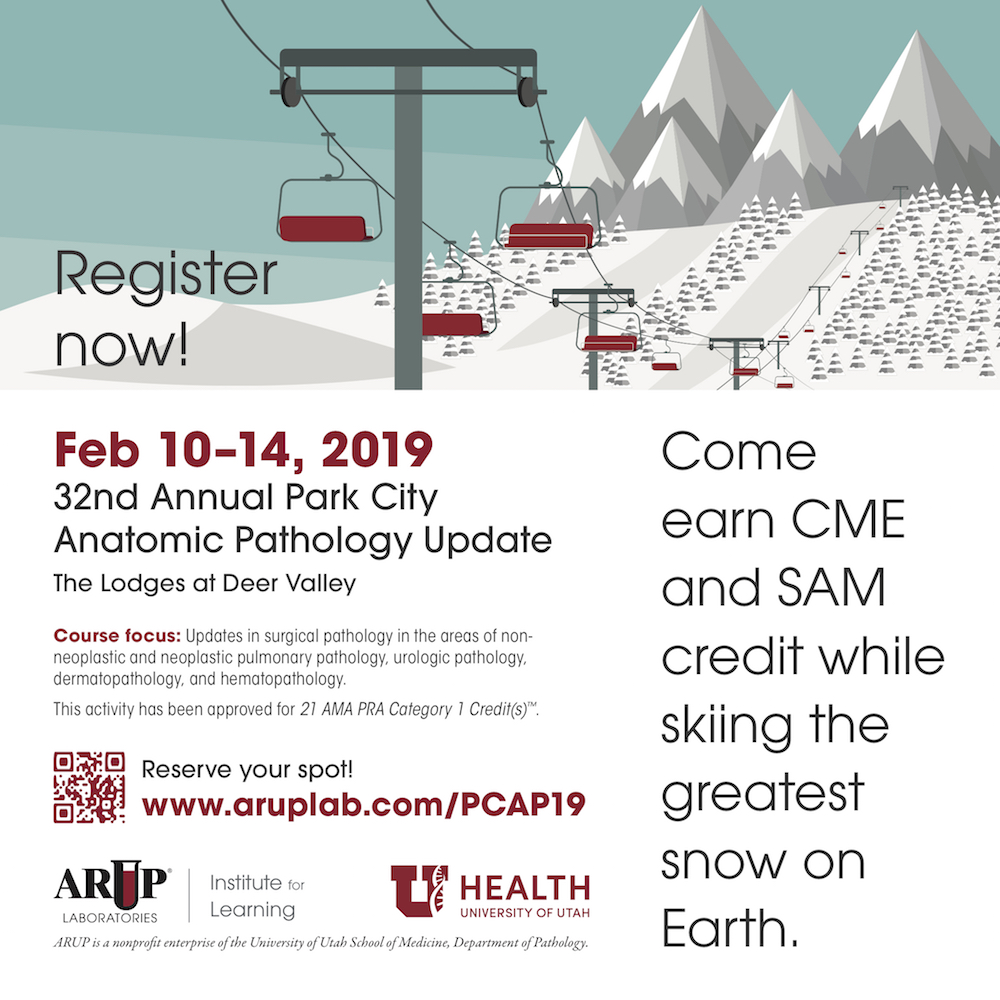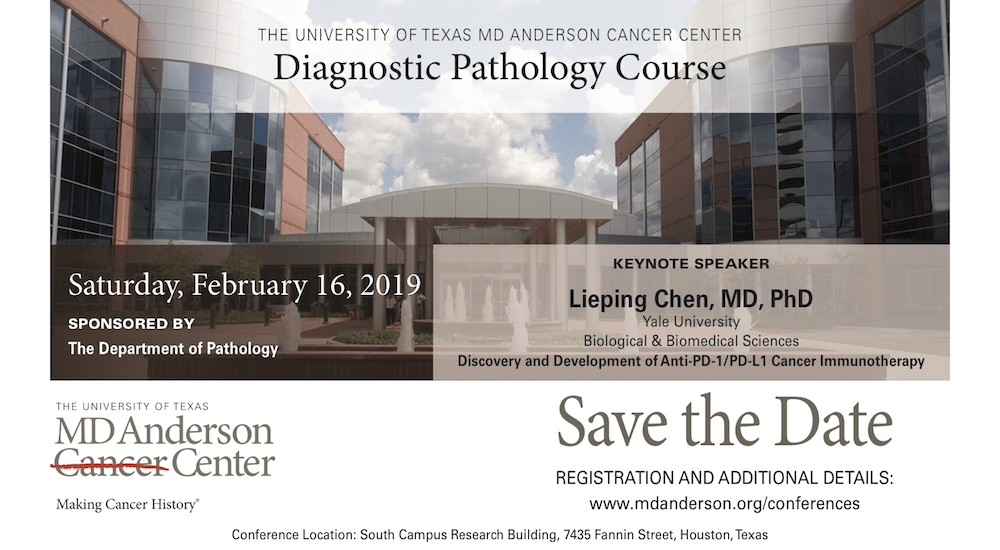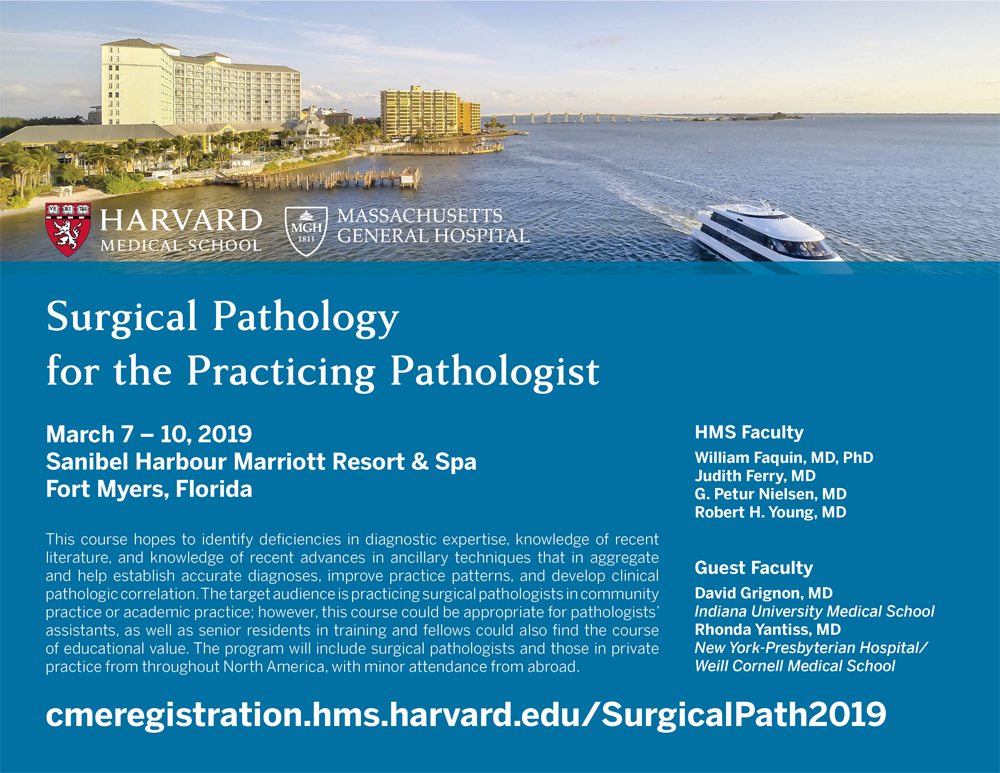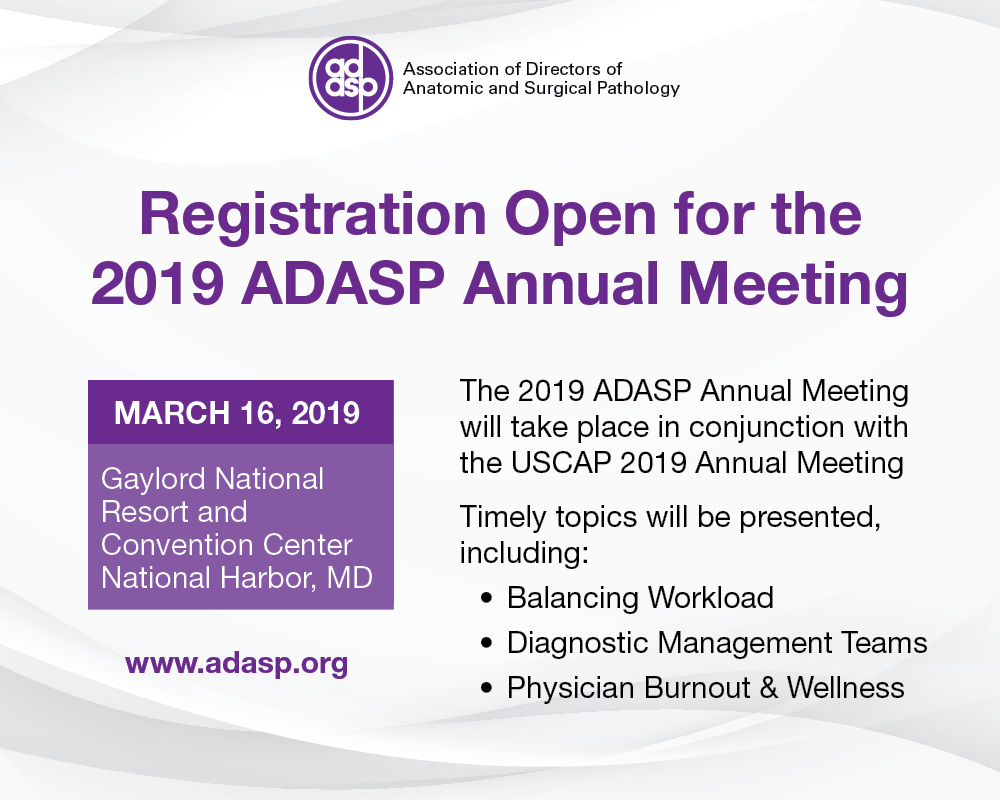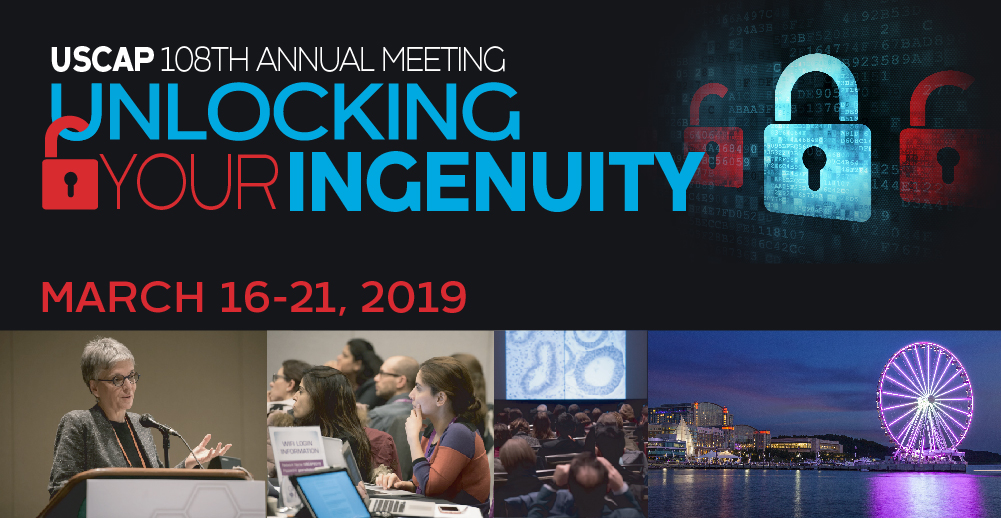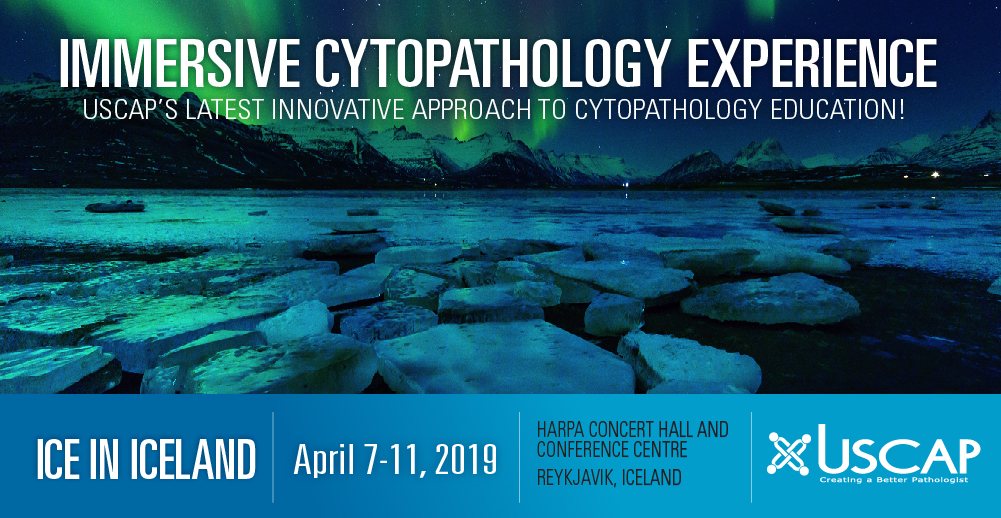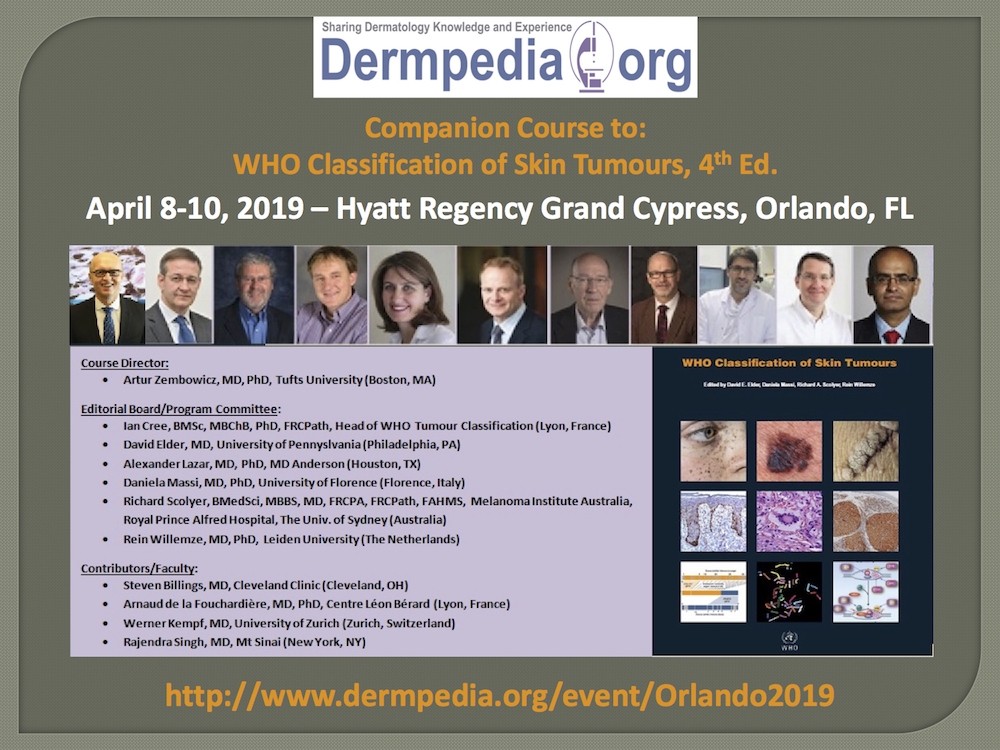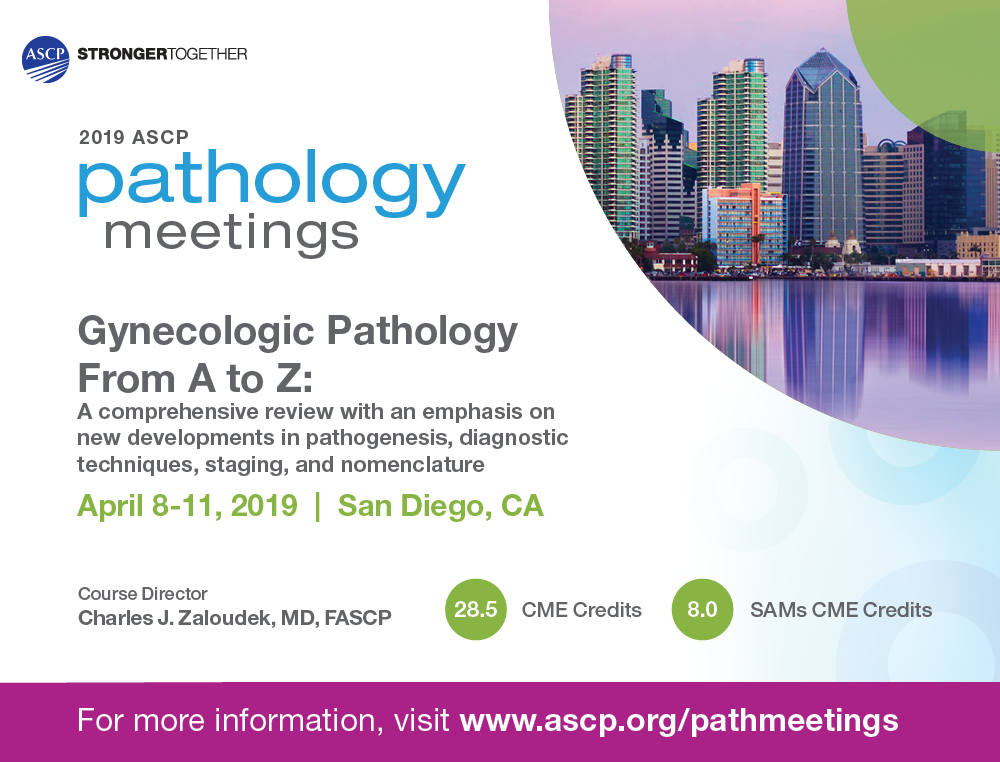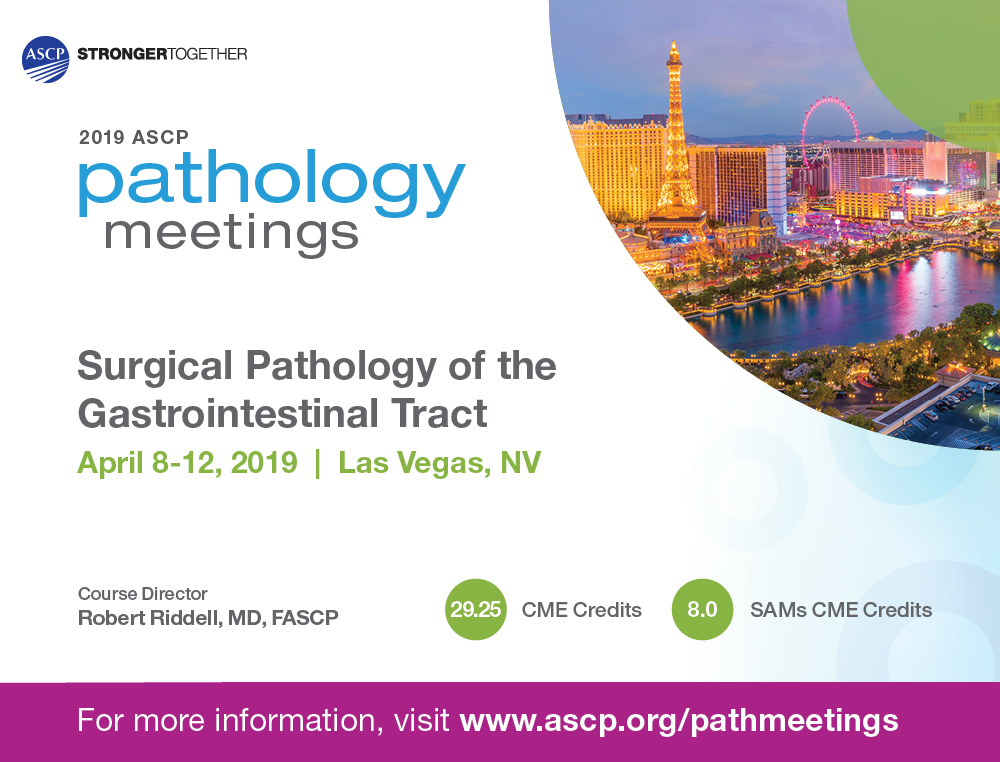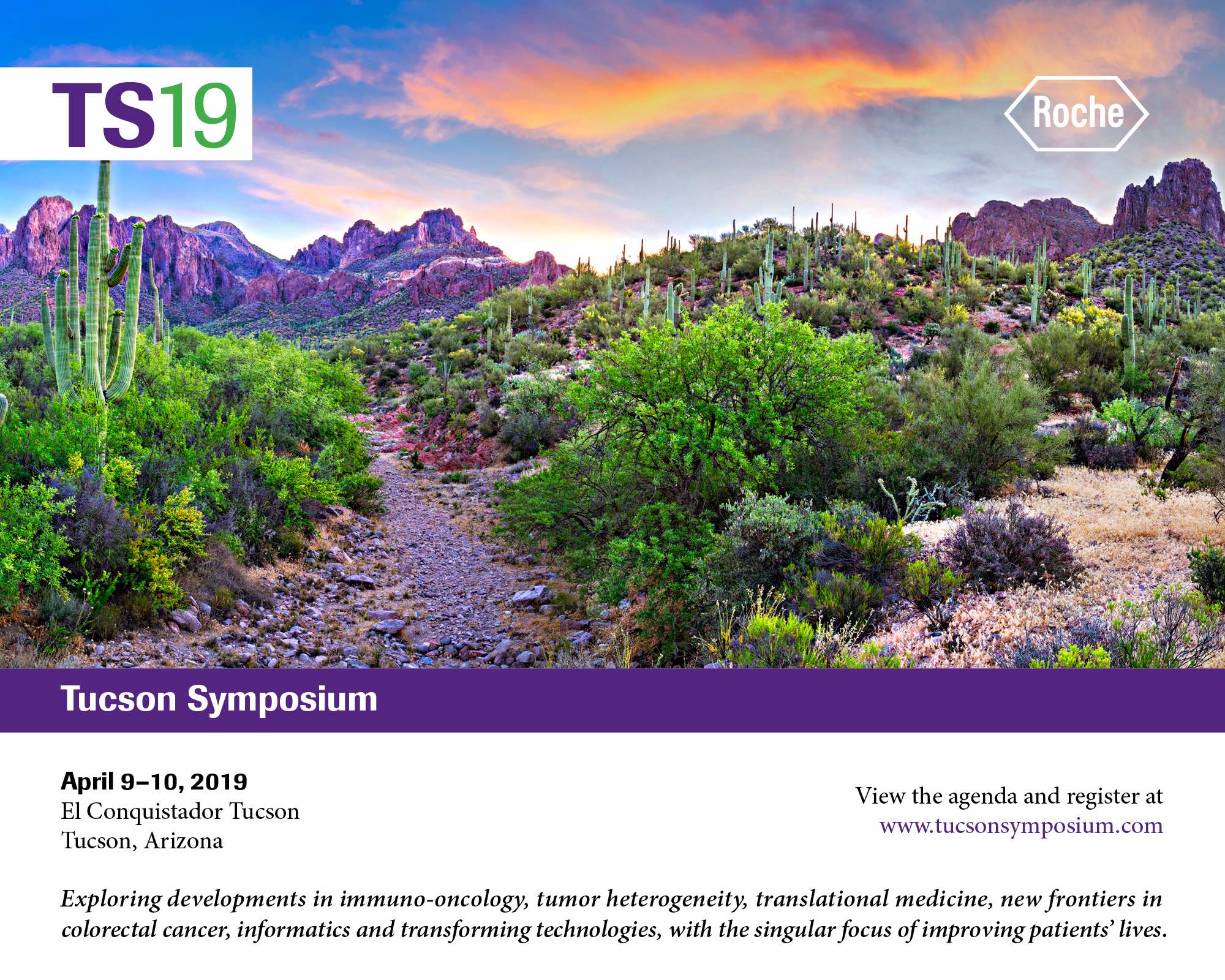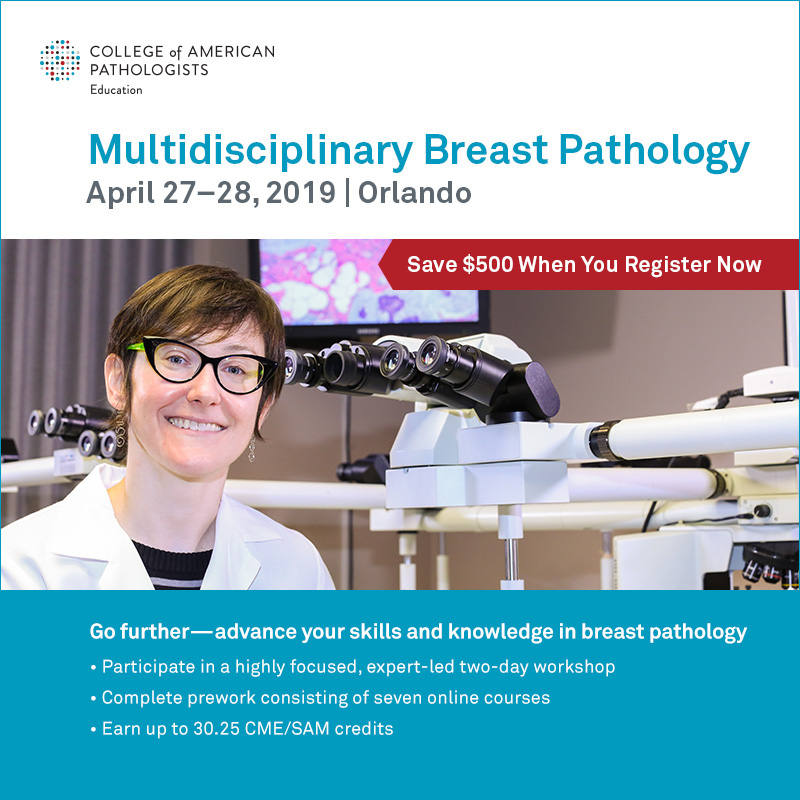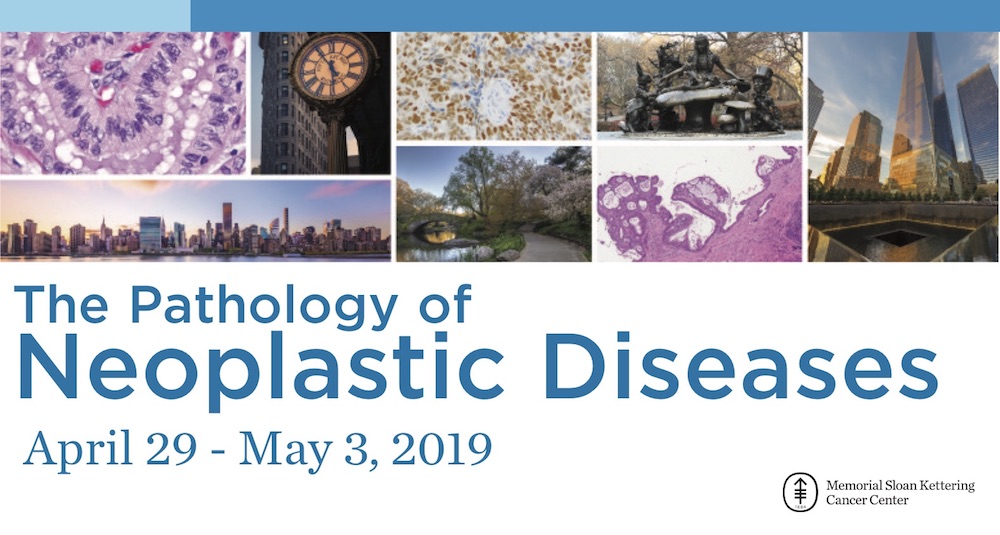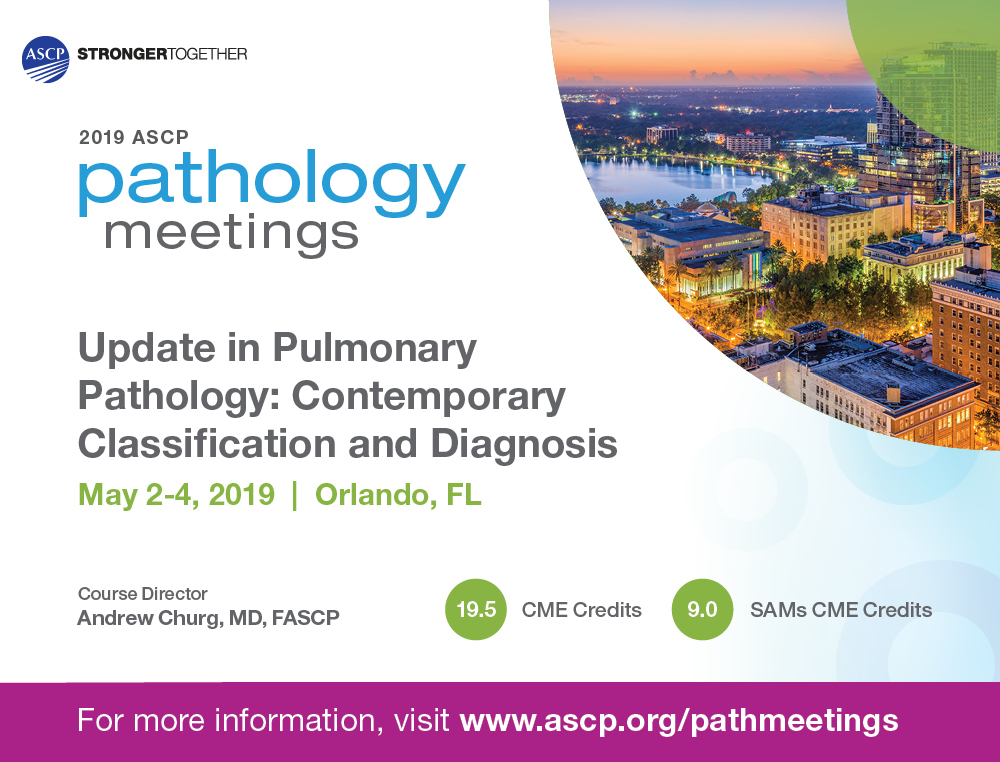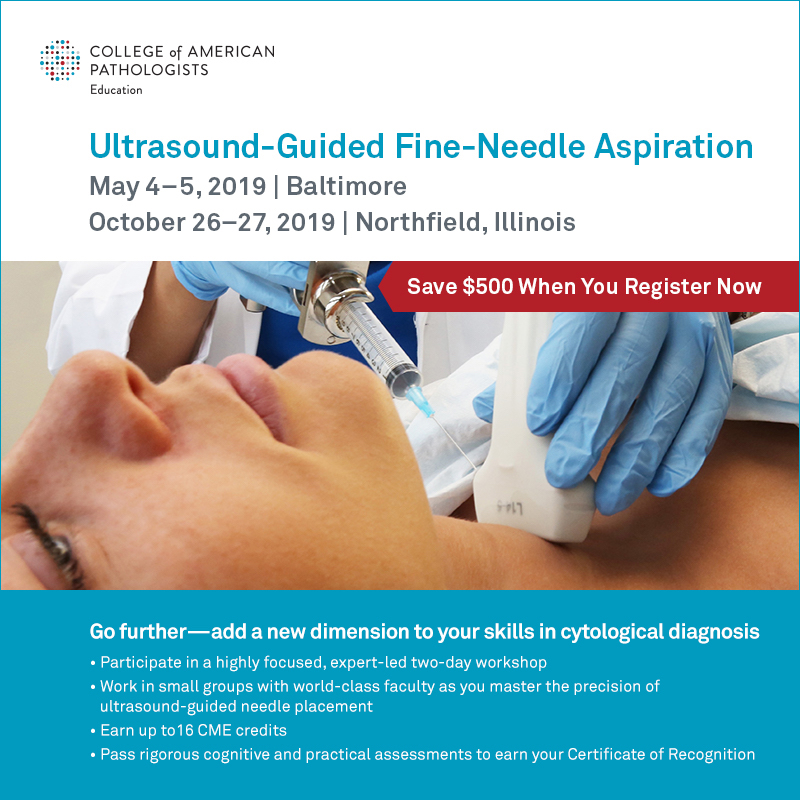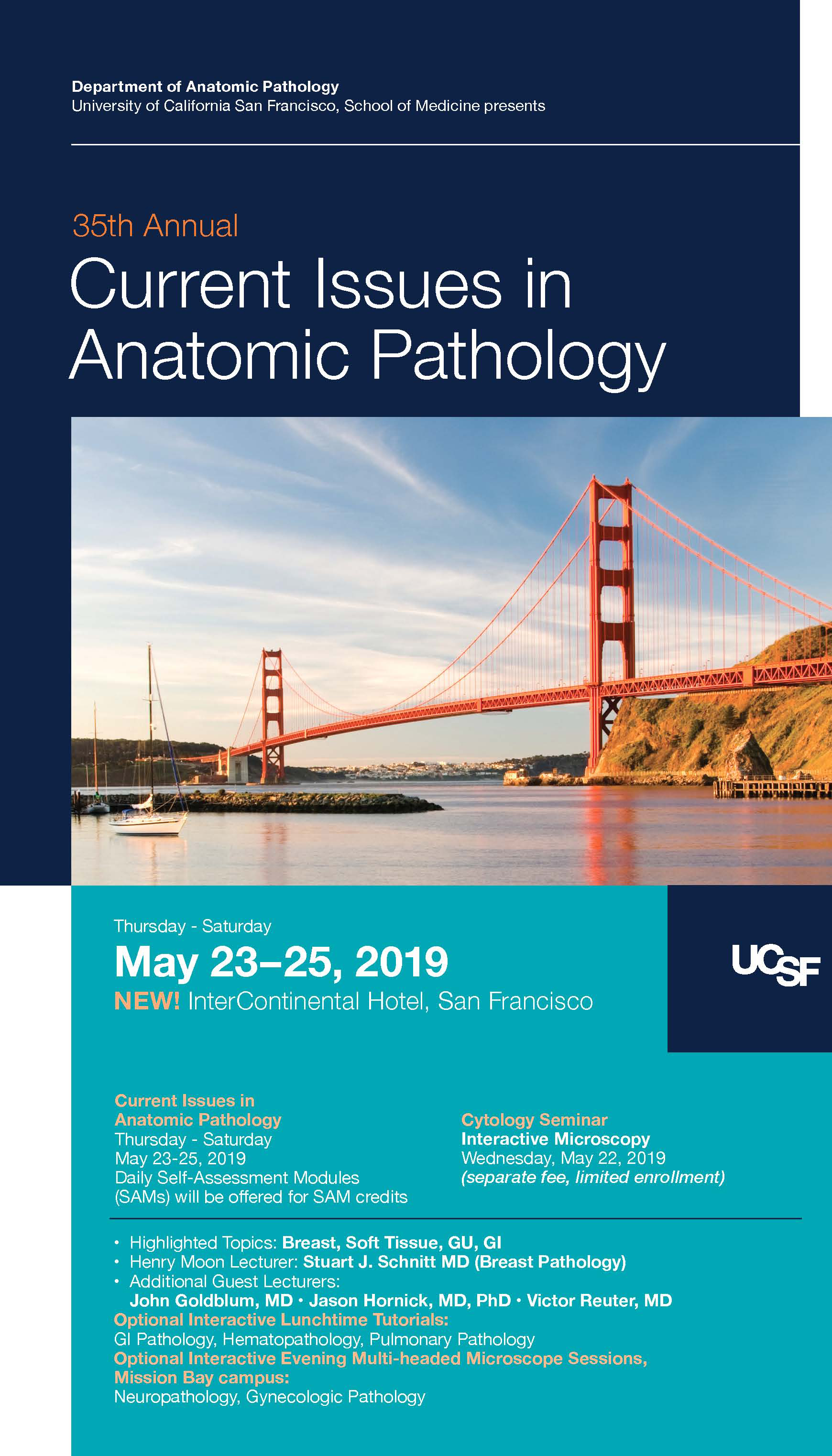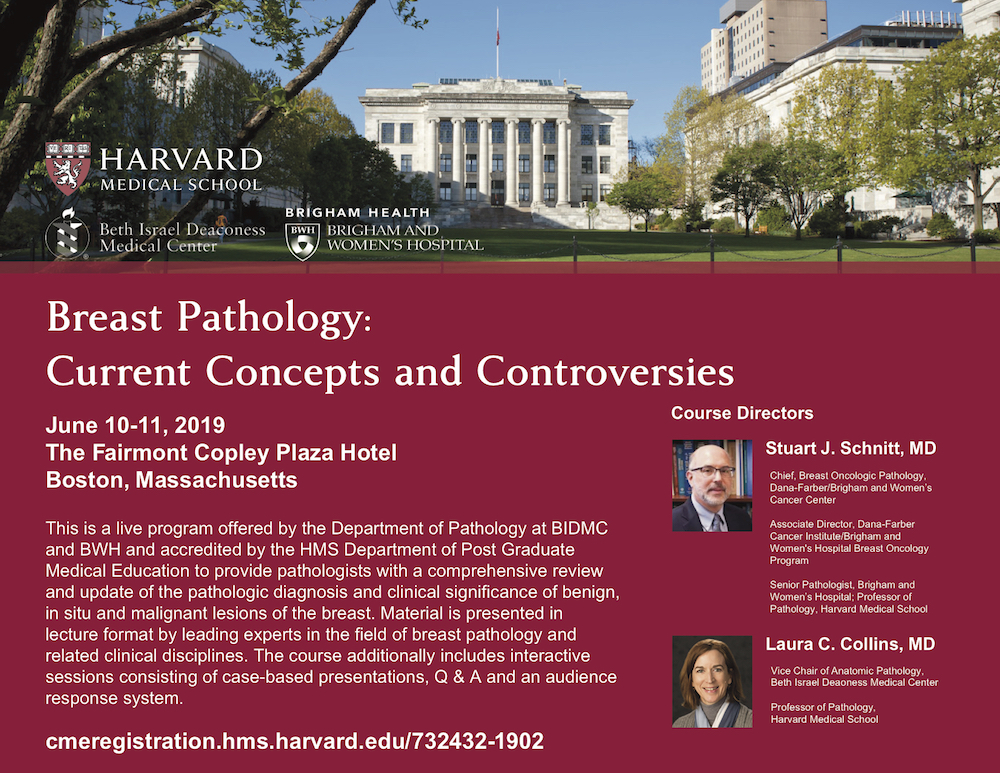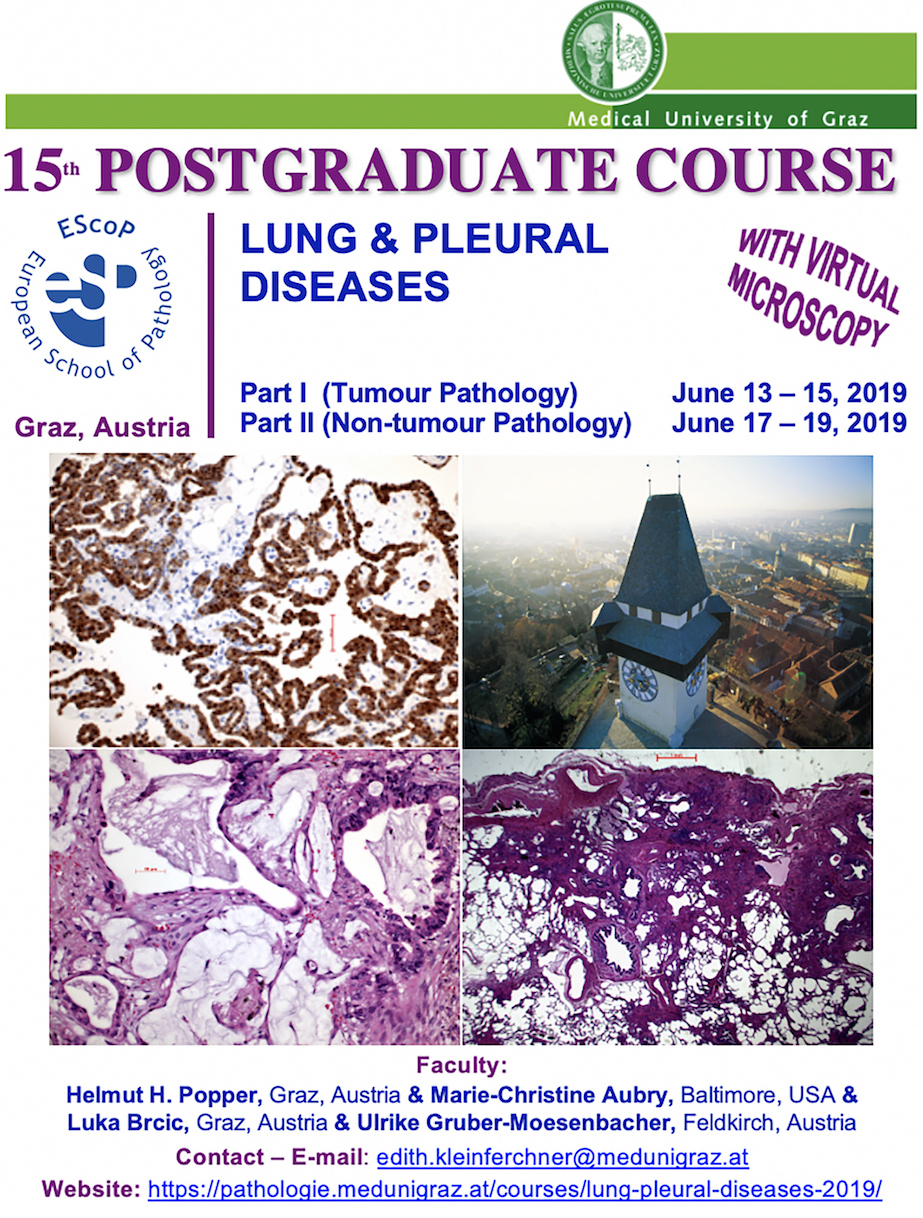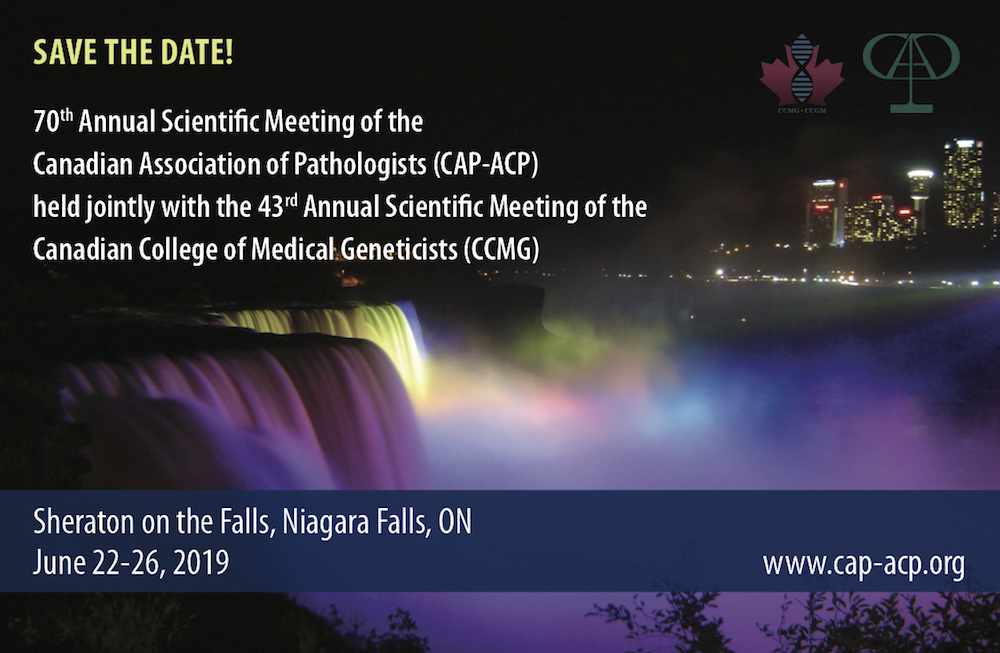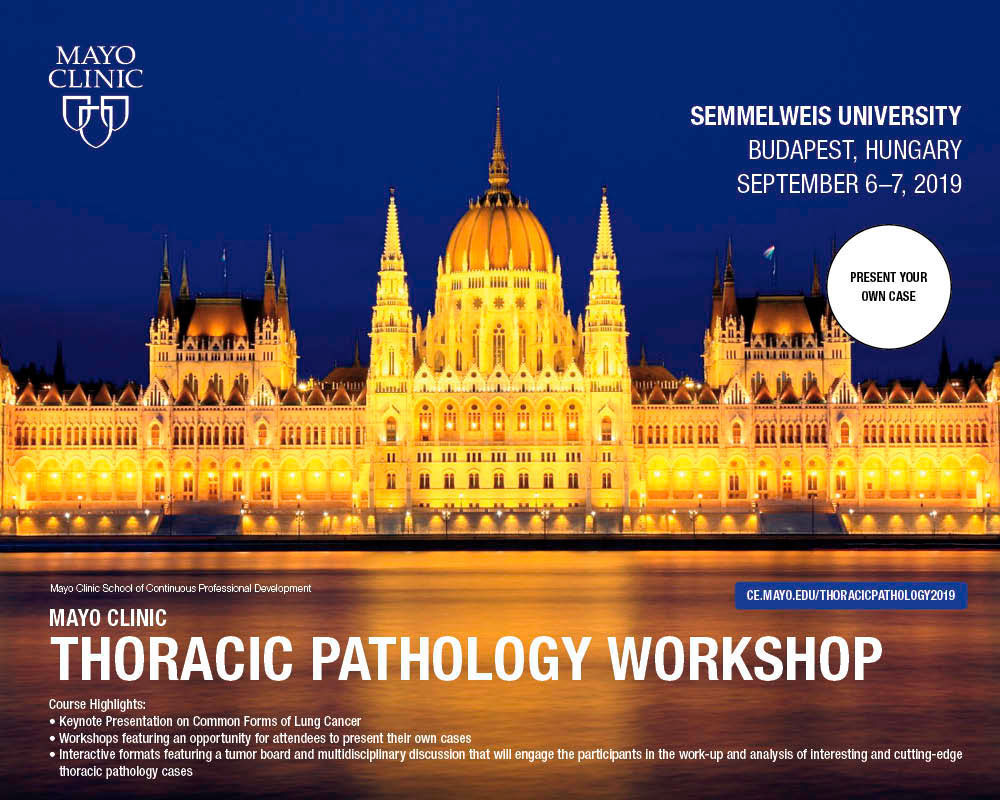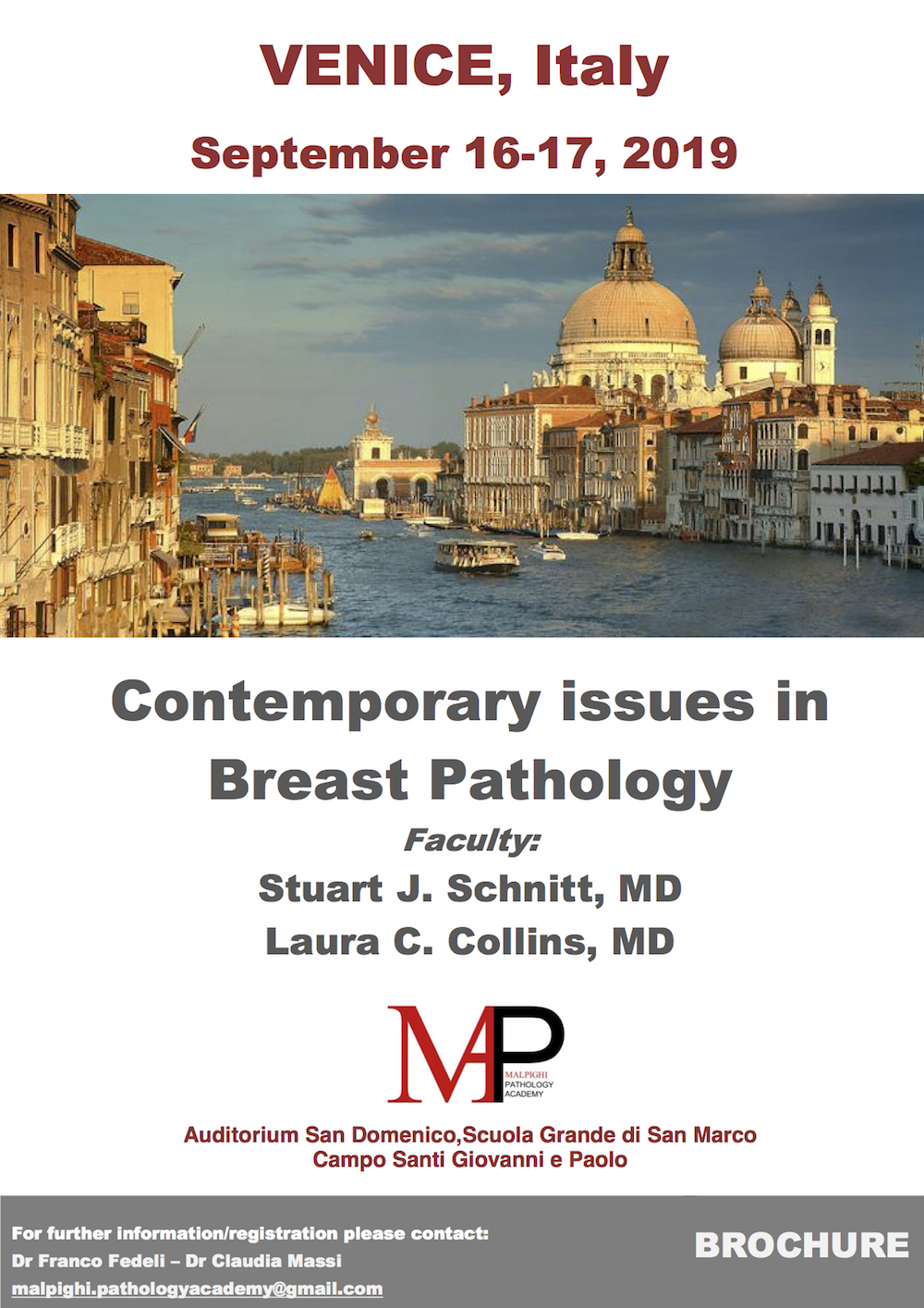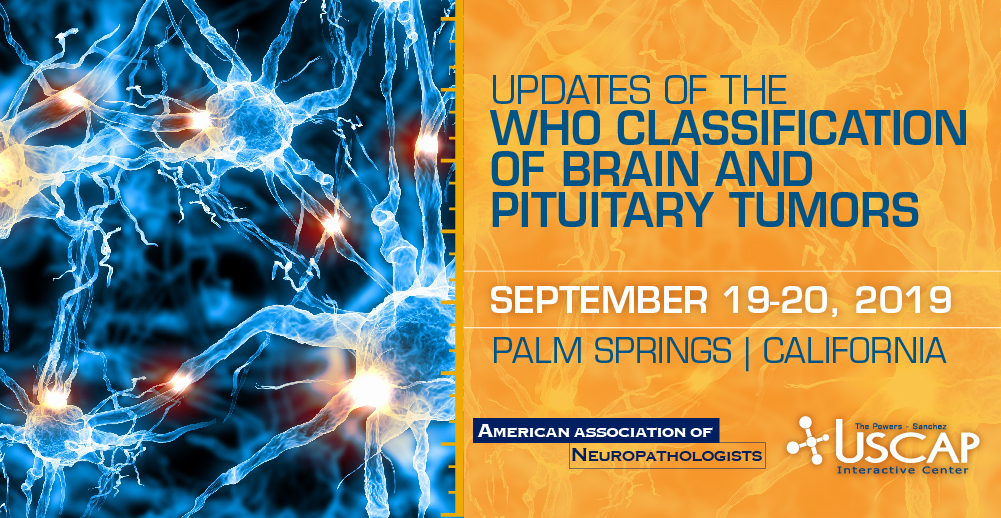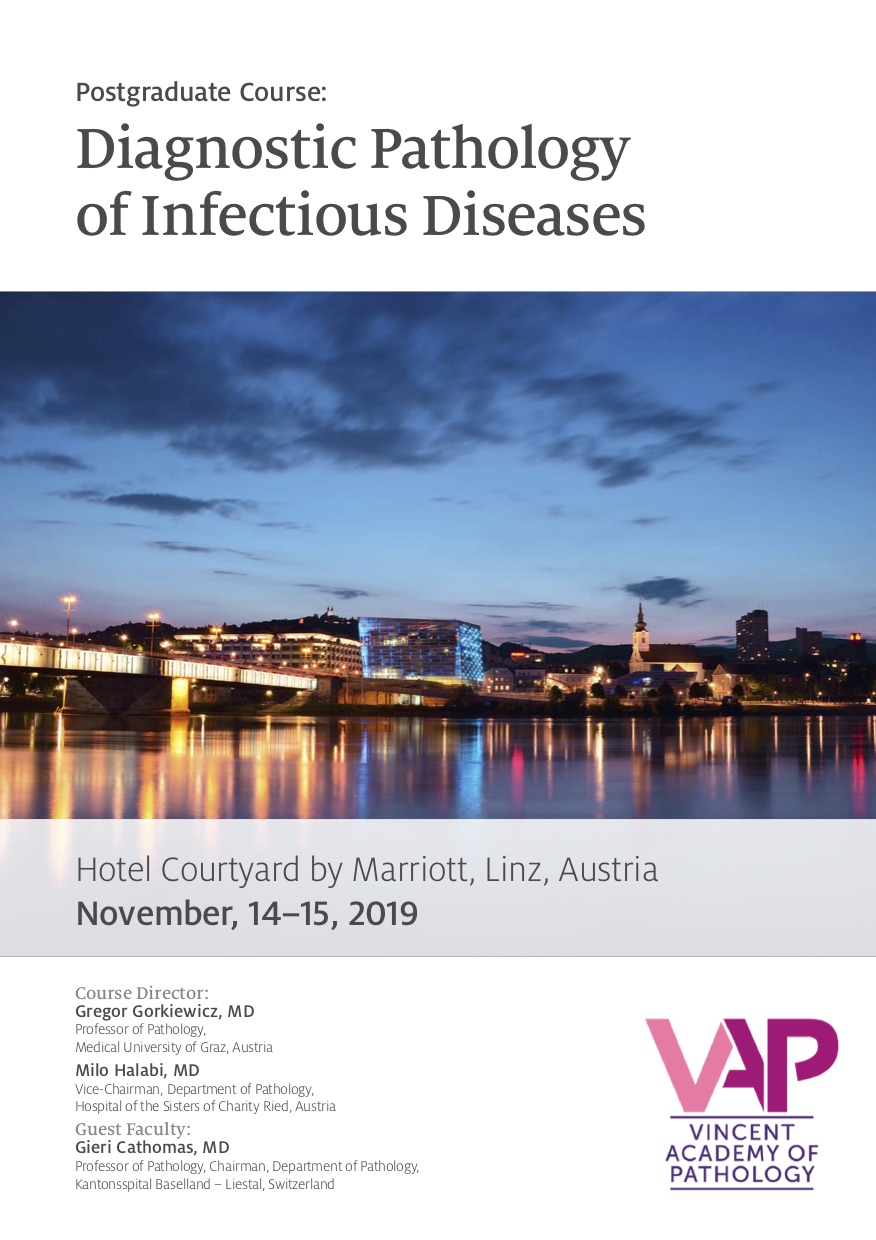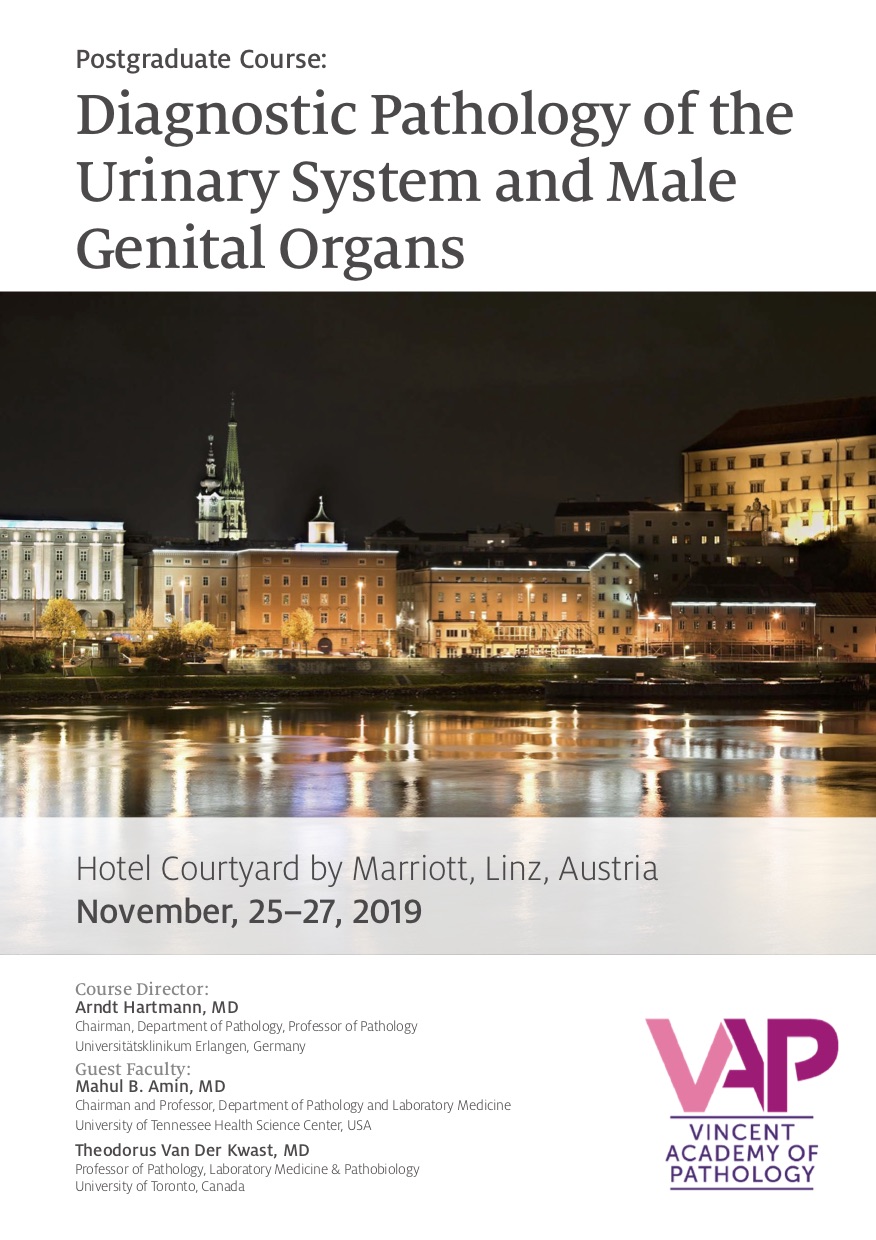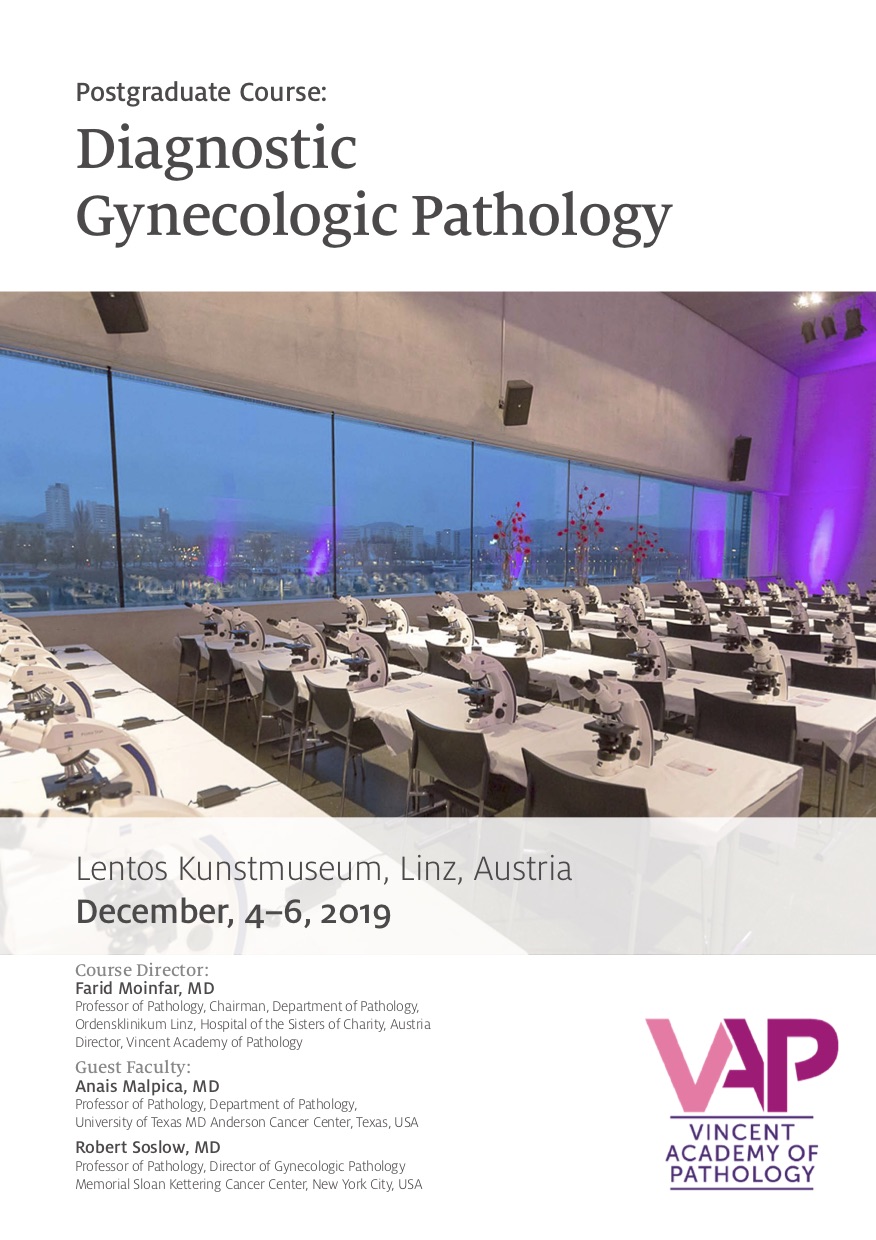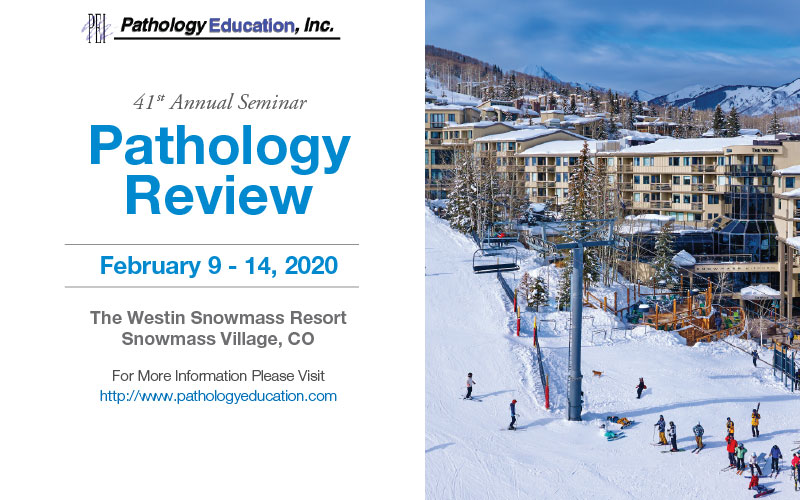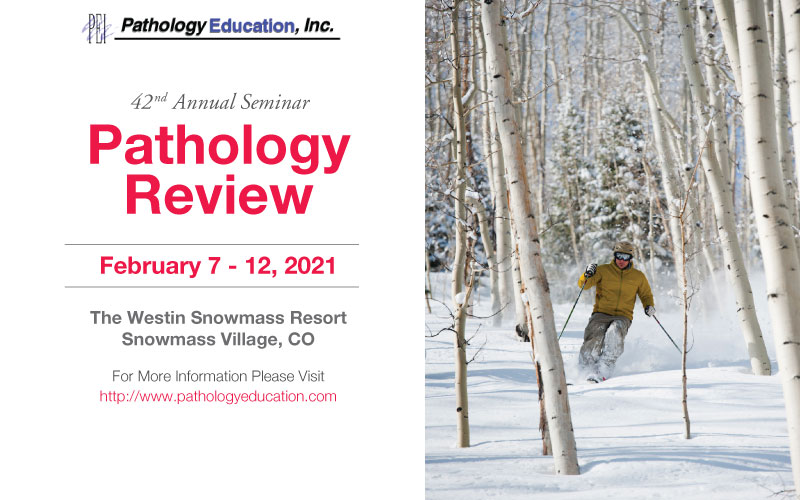Advertise your Pathology Conferences and Webinars with us!
To reach the 8,000 monthly visitors of this page, email your text, graphics and contact information to PathOutAds@gmail.com.
Ads are posted until the conference / webinar date. Email us once you have the date and we will create a Save the Date ad to use until you get your official ad; there is no additional charge for changes.
We have these options for posting:
(a) $375 for a one line listing (date, location, title and link), pay online
(b) $675 for a highlighted listing (most of the ads below are highlighted listings) with graphics, text and links, pay online
(c) $1,500 for a highlighted listing plus one E-blast (example) or social media posting featuring your ad, pay online
(d) $2,300 for a highlighted listing plus two E-blasts or social media postings featuring your ad, pay online
(e) $2,000 for a highlighted listing plus a premium E-blast, pay online
(f) $3,645 for 6 highlighted listings (10% off) plus one E-blast or social media posting plus an Organization listing below, pay online
(g) Contact us for additional promotional packages
Links to all recent posts are included in an E-blast sent biweekly to 5,836 subscribers for no additional charge.
Frequently asked questions Testimonials
Map of US with regions
January 1 - May 31, 2019, Sarcoma Coalition: CME Certified, Methods for Improved Diagnosis of Sarcoma [#7958]
![]()
January 21st - January 25th, 2019
Naples Grande Beach Resort
Naples, Florida
Tutorial on Neoplastic Hematopathology

The Tutorial, sponsored by The Department of Pathology and Laboratory Medicine, Weill Cornell
Medicine, will be held under the direction of Dr. Daniel M. Knowles of Pathology and Laboratory
Medicine. The program will consist of lectures and case presentations. The Tutorial faculty will
prepare extensive lecture notes and reference citations electronically on our website, which will
cover all topics presented at the Tutorial.
The registration fee is $1,350, after December 28, 2018 $1,450.
For further information, please contact:
Ms. Jessica Misner
Department of Pathology and Laboratory Medicine
WMC Room-302
1300 York Avenue
New York, N.Y., 10065
Telephone: (212) 746-6464
Fax: (212) 746-8192
Email: jep2018@med.cornell.edu
Website: www.cornellpathology.com
Registration: https://pathology.weill.cornell.edu/register-online-tutorial-neoplastic-hematopathology
[#7038c]
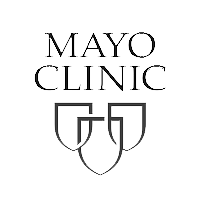
Thursday – Saturday, January 24-26, 2019
Juanita Kios Waugh Auditorium
Mayo Clinic Franke Education Center
5777 East Mayo Boulevard
Phoenix, AZ 85054
Mayo Clinic Pathology Update 2019
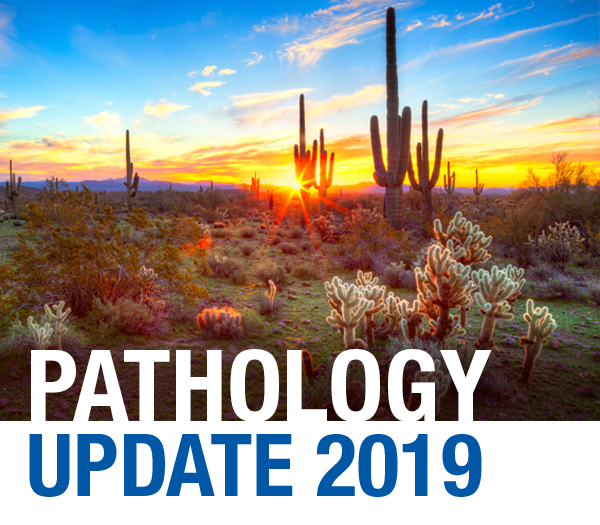
Course website/registration - https://www.ce.mayo.edu/PathUpdate2019
• An elite roster of speakers joins world-renowned pathologists, Dr. John Hart, Dr. Ming Zhou, and Dr. Lysandra Voltaggio, at our 4th annual, 2.5-day general surgical pathology course.
• Topics include: Gastrointestinal, gynecologic, genitourinary, cytology, soft tissue, skin, and hematologic organ systems.
• Presentations will include practical discussions of diagnostic challenges, need-to-know molecular updates, and emerging issues. Attendee participation is encouraged via audience response system and engaging case reviews.
Course Directors:
Longwen Chen, M.D., Ph.D.
Marcela A. Salomao, M.D.
Melissa L. Stanton, MD
Target Audience:
This course is designed for pathologists, pathologist assistants, pathology fellows and residents, and allied health staff with an interest in diagnostic pathology. It is also intended for surgeons and oncologists with an interest in new pathologic staging criteria.
[#7461]
USCAP Presents:
Liver Pathology: Translating a World of Colors into Clinically Relevant Pathology Reports
The microscopic pattern of liver biopsies for non-neoplastic diseases has changed with increasing emphasis on steatohepatitis, fibrosis regression and drug-induced liver disease. The reasons for these changes (based on consultative cases at several large medical centers) include classification of an hepatic pattern of injury, primary biliary cholangitis, fatty liver disease, autoimmune hepatitis, etiology of cirrhosis and transplant pathology (unpublished data). Among the neoplastic cases, hepatocellular carcinoma, cholangiocarcinoma/metastatic adenocarcinoma and hepatocellular adenoma are the leading areas that cause problems in diagnosis for practicing pathologists. Advances in radiologic techniques facilitate targeting smaller lesions, necessitating judicious use of immunohistochemistry.
In the last few years, characteristic molecular changes have been described in a variety of liver tumors and are increasingly being used for diagnosis. Take advantage of this fantastic mentoring opportunity to study liver interactively with experts who can improve your performance and enhance your practice.
You should consider taking this course in contiguity with Twists and Turns of Problematic GI Pathology and How to Find Your Way Out!, directed by Dr. Gregory Y. Lauwers, H. Lee Moffitt Cancer Center/University of South Florida, January 27-30, 2019.
Course Location: Palm Springs, CA
Course Director: Sanjay Kakar, M.D.
USCAP Presents:
Twists and Turns of Problematic GI Pathology and How to Find Your Way Out!
This interactive microscopy course is intended to provide an all-around review of gastrointestinal biopsy pathology for general surgical pathologists, junior GI pathologists, and pathologists-in-training, focusing on unusual lesions and common problematic areas of biopsy interpretation and analysis of appendectomy specimens. Course structure follows GI anatomic topography emphasizing key diagnostic features of inflammatory, infectious and neoplastic pathology as encountered in daily practice.
The faculty intends to stimulate dialogue around differential diagnoses, variations in presentation, effective use of ancillary tests and diagnostic decision-making. This is a superb opportunity to refine your skills by direct interaction with enthusiastic rock stars of gastrointestinal pathology at USCAP’S fabulous interactive learning center. You should consider taking this course in contiguity with Liver Pathology: Translating a World of Colors into Clinically Relevant Pathology Reports, directed by Dr. Sanjay Kakar, UCSF, January 24-26, 2019.
Course Location: Palm Springs, CA
Course Director: Gregory Y. Lauwers, M.D.
USCAP Presents:
Pathology and Cytology of the Lung, Pleura, Mediastinum and Heart/Lung Transplantation
Pathologists are generally unfamiliar with a variety of entities in lung, pleural and mediastinal pathology, leading to diagnostic errors. Furthermore, issues related to heart/lung transplantation require specialized knowledge and experience. Interactive microscopy at the USCAP Learning Center provides a unique and intimate mentoring opportunity to discuss interstitial lung disease, pleuro-pulmonary malignancies, transplant rejection, and the cytomorphologic representation of specimens from these sites, including best practices for optimal triage of lung cancer specimens for molecular testing.
Course Location: Palm Springs, CA
Course Directors: Henry D. Tazelaar, M.D. and Andrew Churg, M.D., Ph.D.
USCAP Presents:
Head and Neck Cytopathology: Practical Tools for Common Cases
Early diagnosis of a myriad of benign and malignant diseases (presenting as swellings) affecting the head and neck provides the best chance for successful treatment. Fine Needle Aspiration (FNA) is an expedient and cost-effective method to sample these masses and is the primary biopsy method for thyroid and salivary glands and a useful approach to evaluate lymph nodes. The majority of practicing pathologists have not completed formal fellowship training in cytopathology and do not have a diagnostic paradigm for these relatively common specimen types. This course is intended to help close the gap by building a strong foundation in head and neck cytopathology and familiarizing attendees with the common diagnostic challenges encountered when evaluating FNA specimens from the thyroid, salivary glands and lymph nodes. The outcome should be an increase in the number of definitive diagnoses, reduction in equivocal diagnoses, and mitigation of repeat FNA or subsequent invasive procedures. The target audience is general pathologists with an interest in cytopathology, pathology residents and fellows, surgical pathology fellows and cytopathology fellows.
Course Location: Palm Springs, CA
Course Directors: Elham Khanafshar, M.D., MS and Britt-Marie E. Ljung, M.D.
Unlock Your Ingenuity at the 108th USCAP Annual Meeting in National Harbor, Maryland from March 16-21, 2019.
People gather from around the world each year at the Annual Meeting. They come for discovery, to experience others' imagination, to learn, sustain, excel, grow, experience. They come for reunion, exchange, sharing, and inspiration.
This year's venue is compelling, offering the convenient integration of hotel and convention space under a glass ceiling, at the edge of the bay, just outside our nation's capital. Shuttles will operate to Washington, D.C. to encourage new experiences outside the conference milieu. Inside will be the organized content you expect, with special sensitivity to diversity and inclusion.
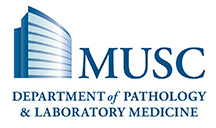
The Department of Pathology and Laboratory Medicine at the
Medical University of South Carolina
presents the
2019 Pathology Multi-Specialty Symposium
Kiawah Island Golf Resort
April 2nd through April 6th, 2019

The Pathology Multi-Specialty Symposium is a 5-day post-graduate seminar annually presented by The Department of Pathology and Laboratory Medicine of the Medical University of South Carolina. The course provides the highest level of subspecialty instruction by a distinguished faculty drawn from the nation's leading experts.
The seminar includes one day of clinical pathology, two and one-half days of surgical pathology, one and one-half days of cytopathology and one day of dermatopathology. CME credits and SAMs may be earned.
This year's symposium will be held at the Kiawah Island Golf Resort located on Kiawah Island from April 2nd through April 6th, 2019.
© Department of Pathology and Laboratory Medicine, Medical University of South Carolina
This activity has been approved for AMA PRA Category 1 Credit™
[#7648]
USCAP Presents:
Diagnostic Challenges in Hematopathology
Hematopoietic neoplasms are highly heterogeneous, composed of numerous clinicopathologic subtypes and variants, and may present at many organ sites. The diagnostic evaluation of lymphomas and hematopoietic neoplasms presenting at nodal and extra-nodal sites requires careful integration of histologic, immunophenotypic, clinical and molecular features. Furthermore, rapid advances in the genetic/genomic understanding of these diseases pose a significant challenge to staying abreast of the diagnostic criteria, immunophenotypic and molecular prognostic/therapeutic markers that have clinical impact. This is underscored by diminishing sample sizes in biopsies of extra-nodal lesions and needle core biopsies of lymph nodes. In addition, the role of the pathologist as integrators of information is expanding rapidly.
This educational activity will highlight practical aspects representing important changes that impact the diagnostic approach to challenging extra-nodal hematopoietic neoplasms, cutaneous lymphomas, T-cell lymphomas and needle core biopsies from lymph nodes. Experience one-on-one learning from experts who will share their varied and profound experience in an aesthetic and dynamic venue, recalling the clinical sign-out of your training years.
Course Location: Palm Springs, CA
Course Director: Megan S. Lim, M.D., Ph.D.
The introduction to Cancer Cytopathology's inaugural Supplement (Volume 125/Issue 6/June 2017) leads with the concept that cytopathology is the nexus for patient-centered care. The convergence of minimally invasive diagnostic and therapeutic techniques, refinements in imaging and guided biopsies, molecular testing and whole genome sequencing, the emergence of targeted therapies, and the awakening of pathologists to their critical role in patient care, safety and outcomes have created a new force in medicine: pathologists are critical members of the health care team and patients are at the center of their concerns and efforts.
Immersive Cytopathology Experience (ICE) has been redesigned for presentation at a fabulous venue in Reykjavik, Iceland, combining concepts from Diagnostic Cytopathology and classical ICE (a hands-on learning experience at the USCAP Interactive Learning Center). There is monumental value in case-based learning that simulates multidisciplinary collaborative interaction of hospital-based tumor boards. This program is highlighted by the interaction of interventional cytopathologists with a surgeon, exemplary patient, and challenging cases from academic institutions, focusing on head and neck clinical lesions.
Classification schemes, the molecular and genetic basis of head and neck disease, procedural approaches to specimen acquisition and processing, empathetic communication, quality and patient safety, and measuring the non-clinical performance of the academic pathologist contribute texture and depth to this learning experience.
The schedule accommodates time for you to experience ICELAND, from The Blue Lagoon to the Northern Lights and locations where Game of Thrones is filmed.
USCAP is transforming how we learn and where we learn. From a 15th century convent in Florence to the Harpa Concert Hall and Conference Centre in Iceland, learners "come from away" for their unique and enduring experience.

Registration (available October 15, 2018): www.vincentacademypathology.com/registration/ [#7656b]
USCAP Presents:
DERMATOPATHOLOGY IN THE DESERT: A SURVIVAL KIT FOR PATHOLOGISTS
This updated course will focus on problem areas in skin pathology encountered by general surgical pathologists and dermatopathologists. The program will focus on a range of neoplastic entities including melanocytic tumors, cutaneous lymphoproliferative diseases, adnexal tumors, and fibrohistiocytic tumors as well as inflammatory lesions everyone should know. The course is taught by an engaging faculty who will emphasize a practical approach to these problematic areas. In addition to the interactive sessions lead by the faculty, participants will have an opportunity to bring their own cases for discussion. By the end of the course, you will have an array of new survival skills for the challenging area of dermatopathology.
Course Location: Palm Springs, CA
Course Director: Steven D. Billings, MD
USCAP Presents:
Practical Neuropathology for Today's Practice
Neuropathology cases provide a particular challenge for practicing surgical pathologists because they are less common than cases from other organ systems, typically comprising fewer than 1% of cases in most practices, and are relatively more complex. Consequently, pathologists have less experience with neuropathology which translates to less comfort in making diagnoses. These mentoring sessions with experts are intended to provide practicing pathologists and pathologists-in-training with strategies relating to how to approach a case, differential diagnostic considerations, ancillary testing useful to resolving differential diagnoses, and the clinical implications of their diagnostic decisions. This is your opportunity to increase your comfort level, confidence and expertise in the interpretation and classification of neuropathology cases you will inevitably see in your diverse practices.
Course Location: Palm Springs, CA
Course Director: Richard A. Prayson, M.D., MEd
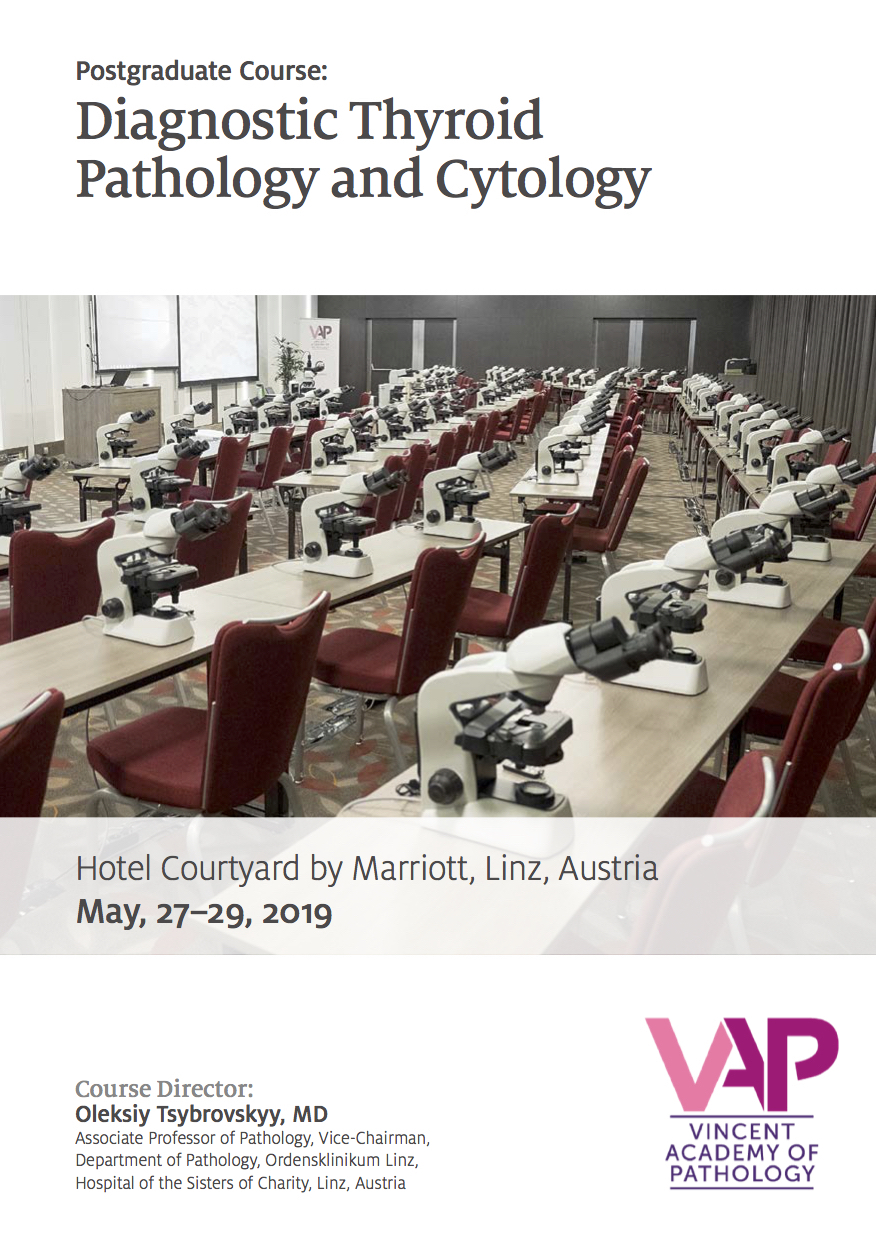
Registration (available October 15, 2018): www.vincentacademypathology.com/registration/ [#7656a]
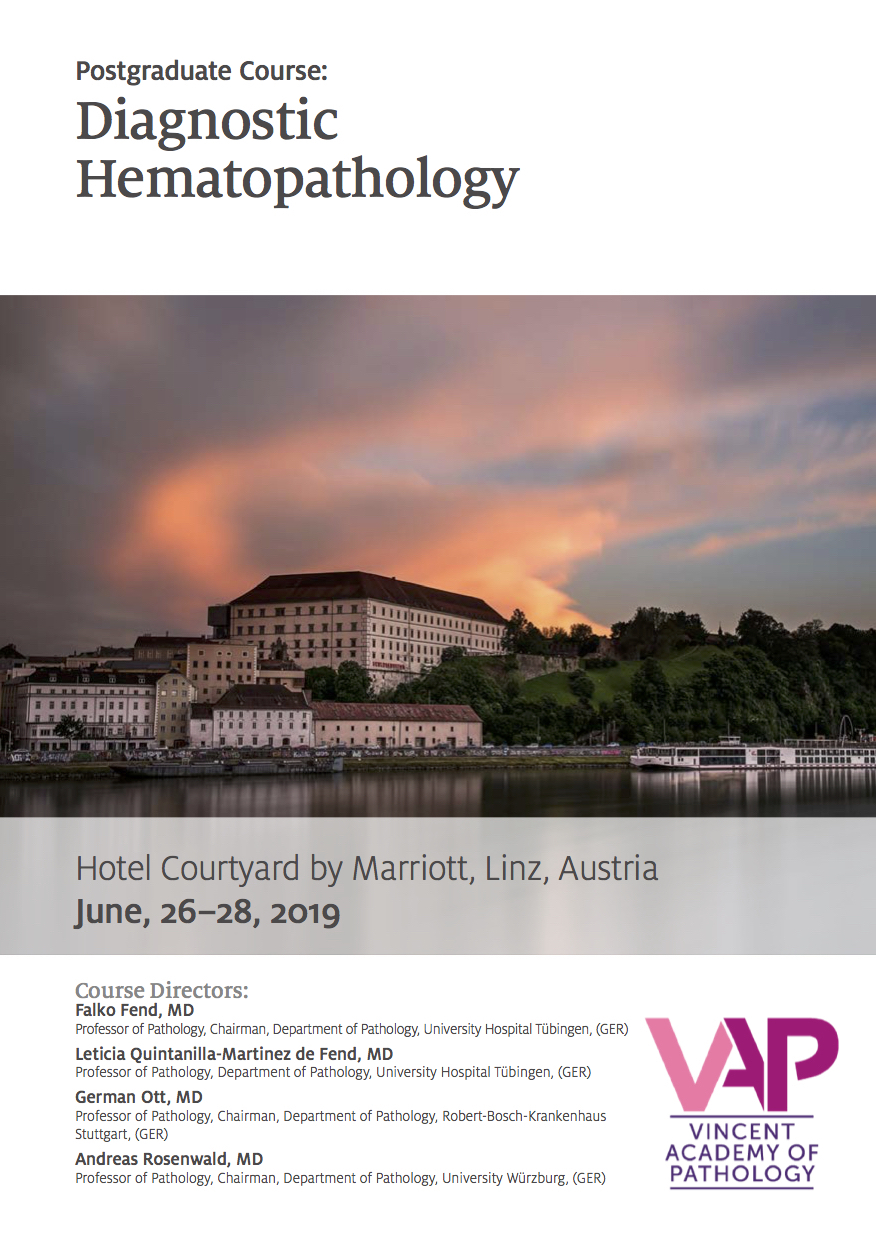
Registration (available October 15, 2018): www.vincentacademypathology.com/registration/ [#7656c]
September 5-7, 2019, The Banff Pathology Course, Banff Centre for Arts and Creativity, Banff, Alberta, (Canada) [#6075f]
USCAP Presents:
Updates of the WHO Classification of Brain and Pituitary Tumors
For the first time, the 2016 WHO classification of central nervous system (CNS) tumors uses molecular parameters in addition to histology to define many tumor entities, thus formulating a concept for how CNS tumor diagnoses should be structured in the molecular era. These new updates will facilitate clinical, experimental and epidemiological studies that will lead to improvements in the lives of patients with brain tumors. General pathologists, in particular, must become familiar with changes in diagnostic criteria and utilize them in their practice improvement strategies. The WHO classification of pituitary adenomas was revised in 2017 and includes (1) a recommendation for the assessment of pituitary transcription factors with focus on adenohypophysial-cell lineage and (2) replacement of “atypical adenoma” with “high risk adenoma” based on tumor proliferation markers and other clinical parameters (such as invasion) to predict aggressiveness. This course will illustrate and reinforce these important updates.
Course Location: Palm Springs, CA
Course Director: Arie Perry, M.D.
USCAP Presents:
Interactive Microscopy with Authors of the Fascicles
Diagnostic surgical pathology is a rapidly evolving field, informed by discoveries in molecular genetics and improvements in tumor classification. Uterine, hepatic, bone, lymphoma, gastroesophageal and soft tissue tumor pathology are examples of subspecialty areas that have made dramatic changes in recent years. Surgical pathologists must become familiar with recent changes in tumor classification, recently developed diagnostic markers, recently discovered molecular genetic alterations and evolving diagnostic criteria for neoplastic and non-neoplastic disorders in surgical pathology. They must also be intuitively conversant with relevant differential diagnoses, ordering appropriate panels of markers and molecular tests, and applying diagnostic criteria to arrive at specific diagnoses.
As a companion interactive microscopy course to the "Fascicles", and with a superbly experienced and creative, visually motivated faculty, this USCAP-ARP experience promises unparalleled mentoring in an aesthetic ambiance, driven by the art of microscopic images.
CLICK HERE TO REGISTER TODAY
Course Location: Palm Springs, CA
Course Directors: Jason L. Hornick, M.D., Ph.D. and Elizabeth A. Montgomery, M.D.
USCAP Presents:
Pediatric Pathology: Selected Topics for General Surgical Pathologists
The practice of pediatric pathology differs significantly from that of adult surgical pathology: certain tumor types and medical conditions are much more common in the pediatric population (e.g., celiac disease, soft tissue sarcomas); the microscopic appearances of certain diseases common to pediatric and adult populations often differ (e.g., non-necrotizing granulomas are much more common in pediatric patients with Crohn's disease compared with adults); and molecular techniques are more commonly employed in the workup of pediatric neoplasia.
This course is intended to familiarize general surgical pathologists with pediatric specimens that occur less commonly in their practices. Highly skilled pediatric pathologists will share their expertise in an intimate mentoring experience at the USCAP Interactive Center where learning is an inevitability.
Course Location: Palm Springs, CA
Course Directors: Theonia K. Boyd, M.D. and Jeffrey D. Goldsmith, M.D.





